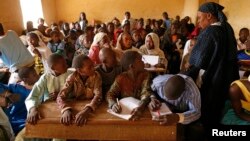On-going fighting has disrupted education for hundreds of thousands of school children in both the north and south of Mali. UNICEF as well as educational authorities there report that some 700,000 children are affected, with 200,000 of those left with no access to school at all.
UNICEF says schools in the north have been closed and looted, and many teachers have failed to return. In the south, schools have become so overcrowded teachers are not able to handle the influx of displaced students from the north.
“At this point there have been more than 115 schools that have been closed or destroyed or looted. One of the other problems that we are facing is that many teachers are still scared to go back to the northern part of the country. And in the southern part, we have already overcrowded schools that have to cope with the influx of displaced students from the north,” explained Laurent Duvillier, UNICEF spokesperson for West and Central Africa. He added this is an extra burden on the teachers and infrastructure.
He explained that in the north only one out of three schools is functioning, and in Kidal, all schools are closed. “That means that a child in Kidal at this stage has no opportunity to get access to education. So that’s extremely concerning, “ said Duvillier.
He said his organization is working to provide educational materials to school children and teachers.
“UNICEF is moving forward first with the distribution of school kits and teaching materials to the teachers and the schools in the southern part of the country, closer to the northern part of the country,” he said.
Duvillier also said they have access to Mopti in the central part of the country.
“So the teachers and the school kids have arrived in Mopti, and we’ll soon be distributing in the northern part of the country, together with our partners and local NGOs,” explained Duvillier.
For those schools that have been destroyed or looted, central learning spaces are being set up under tents where children can learn and play in a safe environment.
UNICEF says schools in the north have been closed and looted, and many teachers have failed to return. In the south, schools have become so overcrowded teachers are not able to handle the influx of displaced students from the north.
“At this point there have been more than 115 schools that have been closed or destroyed or looted. One of the other problems that we are facing is that many teachers are still scared to go back to the northern part of the country. And in the southern part, we have already overcrowded schools that have to cope with the influx of displaced students from the north,” explained Laurent Duvillier, UNICEF spokesperson for West and Central Africa. He added this is an extra burden on the teachers and infrastructure.
He explained that in the north only one out of three schools is functioning, and in Kidal, all schools are closed. “That means that a child in Kidal at this stage has no opportunity to get access to education. So that’s extremely concerning, “ said Duvillier.
He said his organization is working to provide educational materials to school children and teachers.
“UNICEF is moving forward first with the distribution of school kits and teaching materials to the teachers and the schools in the southern part of the country, closer to the northern part of the country,” he said.
Duvillier also said they have access to Mopti in the central part of the country.
“So the teachers and the school kids have arrived in Mopti, and we’ll soon be distributing in the northern part of the country, together with our partners and local NGOs,” explained Duvillier.
For those schools that have been destroyed or looted, central learning spaces are being set up under tents where children can learn and play in a safe environment.




